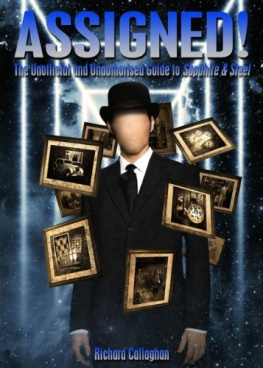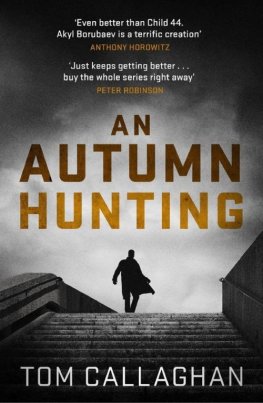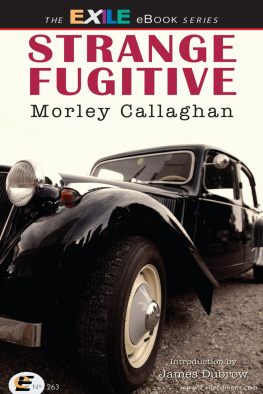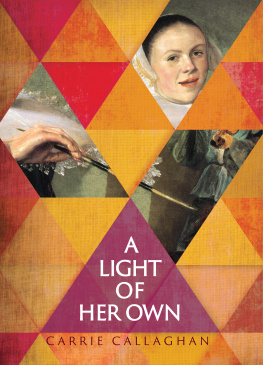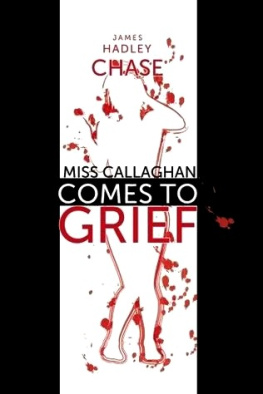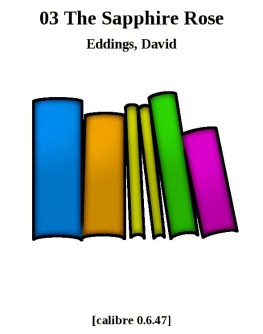ASSIGNED!
THE UNOFFICIAL AND UNAUTHORISED GUIDE TO SAPPHIRE & STEEL
RICHARD CALLAGHAN
First published in England in 2009 by
Telos Publishing Ltd
17 Pendre Avenue, Prestatyn, Denbighshire, LL19 9SH
www.telos.co.uk
This Edition 2013
Telos Publishing Ltd values feedback. Please e-mail us with any comments you may have about this book to: feedback@telos.co.uk
Assigned!: The Unofficial and Unauthorised Guide to Sapphire & Steel 2009, 2013 Richard Callaghan
The moral right of the author has been asserted.
British Library Cataloguing in Publication Data.
A catalogue record for this book is available from the British Library.
This ebook is licensed for your personal enjoyment only. This ebook may not be resold or given away to other people. If you would like to share this book with another person then please purchase an additional copy for each recipient. If you are reading this book and did not purchase it, or it was not purchased for your use only, then please purchase your own copy. Thank you for respecting the hard work of this author.
ACKNOWLEDGEMENTS
I would like to acknowledge my family for their support, Cheryl Burton and Will Griffin (for encouragement), Jonathan Boakes (for discussions about the series), Jim Griffin (for spotting the bit about the newest part of the house) and David Howe and Stephen James Walker (for helping to guide this project to completion).
The people who were kind enough to share their thoughts and reminisces were, in alphabetical order: Philip Bird, David Bishop, David Cann, David Collings, Richard Dinnick, George Douglas, Christopher Fairbank, Nigel Fairs, David Foster, Neil Guy, P J Hammond, Joseph Lidster, Anthony Read, Patricia Shakesby, Jennie Stoller, and Adrian, Russell and Terry Wootton.
All spellings of names, situations and characters have been taken from the episodes themselves and their original scripts.
CONTENTS
Introduction
Production
Main Cast and Crew Credits
Assignment One
Assignment Two
Assignment Three
Assignment Four
Assignment Five
Assignment Six
Afterword
Appendices
Appendix A: The DVDs
Appendix B: The Books
Appendix C: The Comic Strips
Appendix D: The Audio Plays
About the Author
INTRODUCTION
Fantasy television in the late 1970s was not in a terribly good position. The BBCs flagship show, Doctor Who , was tending towards humour in its scripting and set-up, aiming more for a kiddie audience than the adults who had grown up with it, and there was not much else around to capture the imagination of older viewers. This was until a strange little show started airing on Tuesday and Thursday evenings. Perhaps something to do with The Man from U.N.C.L.E. or maybe The New Avengers , at least judging from its two stars, Sapphire & Steel was in fact a neat piece of fantasy programming. Joanna Lumley and David McCallum played the title characters, two mysterious agents, or time detectives who investigated cracks in time through which terrifying creatures could break into the present. Images of the undead, faceless men and whispering, chattering darkness all terrified a generation of children and adults alike. However, its brief run and lack of terrestrial repeat screenings ensured that it perhaps remained only a half remembered nostalgia piece for the now thirty-something generation.
Ironically, it was perhaps the presence of its two stars that kept it from being as well-remembered as it deserves to be, as their CVs are collectively littered with television and film classics. Though The New Avengers hadnt been successful enough to warrant a third season, Lumley was making Sapphire & Steel in the wake of her high profile role as The New Avengers Purdy. McCallum, meanwhile, had been appearing in films since the late 50s, and was infamous as The Man from U.N.C.L.E. s Illya Kuryakin, a role so famous that a reunion show was broadcast the year after Sapphire & Steel ended, and was even referenced in a 2005 episode of the American series NCIS (a show about the Naval Criminal Investigative Service). With such an enormous array of credits to their names, Sapphire & Steel couldnt help but go down in history as just one of many roles that the actors undertook the fact that the viewing public reportedly found the series inexplicable and confusing didnt help matters. During September 1989 McCallum was interviewed by Lumley on the Wogan BBC chat show, where he discussed Mrs Puttock, his mothers cleaner: She saw the first episodes and said, I loved it, but I didn't really understand it, so from then on in we always used to try to make the scripts Puttock proof. Oblique, esoteric and requiring its audience to work, Sapphire & Steel was never about compromise or dumbing down.
Looking back at the show, its interesting to see how well it stands up to a modern day viewing. One thing that has kept the series from dating is that it has no real connection with the time in which it was made. The series is slow by modern standards, favouring atmosphere over pace, and there are some questionable hairstyles. Yet apart from the third story, there were no attempts to include overt political references in the show. As Sapphire & Steel began, the world was in the grip of a renewed increase in the Cold War between America and the Soviet Union, and as the series finished airing in Britain, the country was experiencing the highest level of unemployment since the 1930s. Yet none of this real-world drama finds its way onto screen and the series, which, while bleak, opts instead for self-contained fantasies, almost fairytales, that shy away from analogy. Though often cited as ITVs answer to Doctor Who in listings magazines looking for an angle, there really was nothing else quite like Sapphire & Steel .
In this book, we delve into the six televised assignments for the agents, looking at the continuity and backgrounds to the shows, exploring the goofs and guest stars and providing an appreciative and in depth analysis of each of the stories. Im grateful to everyone who shared their knowledge of the show, and all unattributed quotes in the text come from interviews conducted by myself.
We also look at the ephemera which has emerged around the series, from the novelisation released at the time to the recent series of original audio plays on CD, starring David Warner as Steel and Susannah Harker as Sapphire.
So join us as we once again step into the darkness, as the mysterious control voice informs us that: Sapphire and Steel have been assigned
PRODUCTION
Writer Peter John (P J) Hammond had built his reputation through working on several police thrillers throughout the 60s and early 70s, including a stint as script editor on over 180 episodes of the popular Z Cars .
In the early 70s, he started to move into Childrens telefantasy, working with Pamela Lonsdale on the popular series Ace of Wands . Hammond wrote three stories for this series: The Meddlers (July/August 1972), Peacock Pie (September 1972) and The Beautiful People (November 1972). This was followed by an adaptation of Arthur Morrisons 1902 novel The Hole in the Wall , about a small boy in the mid-19 th Century who becomes involved with his grandfather in a complex array of crimes set in the grimy east end of London, as a seven part series for the BBC transmitted in October and November 1972. In 1978 Hammond worked once more with Lonsdale as his producer, this time with And For My Next Trick an episode of the anthology series Shadows . That same year, Lonsdale, impressed by Hammonds work, commissioned the writer to devise a stand-alone pilot for a possible television series for transmission in the childrens slot between around 4.30 and 6.00pm.
Inspired after witnessing his children enjoying the George Pal cinema version of H G Wells The Time Machine (1960), Hammond sent Lonsdale a proposal for a series based around time, featuring two undefined agents with a mission to protect time itself. The resulting project The Time Menders was taken by Lonsdale to Jeremy Isaacs, Head of Drama at Thames television. Unfortunately Isaacs rejected the proposed series on the grounds that he felt it lacked long-term potential.
Next page
